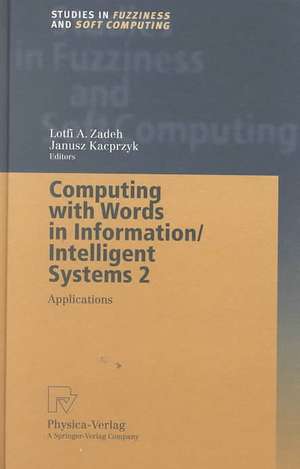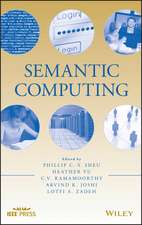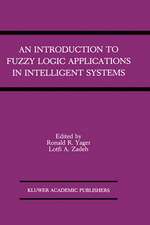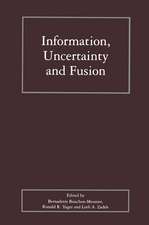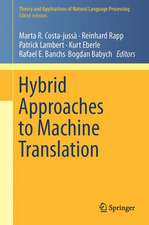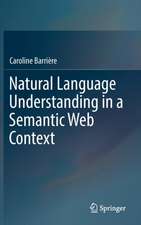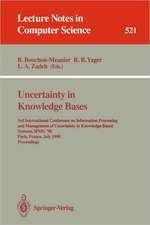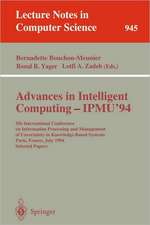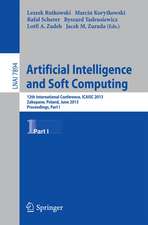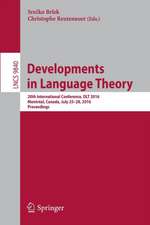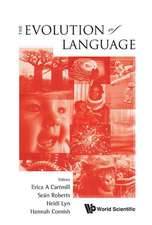Computing with Words in Information/Intelligent Systems 2: Applications: Studies in Fuzziness and Soft Computing, cartea 34
Editat de Lotfi Zadehen Limba Engleză Hardback – 16 iul 1999
| Toate formatele și edițiile | Preț | Express |
|---|---|---|
| Paperback (1) | 1003.17 lei 6-8 săpt. | |
| Physica-Verlag HD – 21 oct 2010 | 1003.17 lei 6-8 săpt. | |
| Hardback (1) | 1009.93 lei 6-8 săpt. | |
| Physica-Verlag HD – 16 iul 1999 | 1009.93 lei 6-8 săpt. |
Din seria Studies in Fuzziness and Soft Computing
- 20%
 Preț: 999.85 lei
Preț: 999.85 lei - 20%
 Preț: 653.06 lei
Preț: 653.06 lei - 20%
 Preț: 872.98 lei
Preț: 872.98 lei - 20%
 Preț: 930.57 lei
Preț: 930.57 lei - 20%
 Preț: 1051.00 lei
Preț: 1051.00 lei - 20%
 Preț: 992.44 lei
Preț: 992.44 lei - 20%
 Preț: 655.85 lei
Preț: 655.85 lei - 20%
 Preț: 1001.86 lei
Preț: 1001.86 lei - 18%
 Preț: 954.14 lei
Preț: 954.14 lei - 20%
 Preț: 330.10 lei
Preț: 330.10 lei - 20%
 Preț: 333.04 lei
Preț: 333.04 lei - 20%
 Preț: 997.56 lei
Preț: 997.56 lei -
 Preț: 391.61 lei
Preț: 391.61 lei - 20%
 Preț: 647.79 lei
Preț: 647.79 lei - 20%
 Preț: 986.01 lei
Preț: 986.01 lei - 18%
 Preț: 958.56 lei
Preț: 958.56 lei - 20%
 Preț: 996.40 lei
Preț: 996.40 lei - 20%
 Preț: 999.35 lei
Preț: 999.35 lei - 15%
 Preț: 646.43 lei
Preț: 646.43 lei - 20%
 Preț: 651.57 lei
Preț: 651.57 lei - 20%
 Preț: 997.89 lei
Preț: 997.89 lei - 15%
 Preț: 641.03 lei
Preț: 641.03 lei - 20%
 Preț: 1009.74 lei
Preț: 1009.74 lei - 20%
 Preț: 992.62 lei
Preț: 992.62 lei -
 Preț: 388.72 lei
Preț: 388.72 lei - 18%
 Preț: 1223.43 lei
Preț: 1223.43 lei - 20%
 Preț: 651.42 lei
Preț: 651.42 lei - 18%
 Preț: 951.59 lei
Preț: 951.59 lei - 18%
 Preț: 948.61 lei
Preț: 948.61 lei
Preț: 1009.93 lei
Preț vechi: 1262.42 lei
-20% Nou
Puncte Express: 1515
Preț estimativ în valută:
193.26€ • 206.65$ • 161.13£
193.26€ • 206.65$ • 161.13£
Carte tipărită la comandă
Livrare economică 17 aprilie-01 mai
Preluare comenzi: 021 569.72.76
Specificații
ISBN-13: 9783790812183
ISBN-10: 3790812188
Pagini: 632
Ilustrații: IX, 610 p.
Dimensiuni: 155 x 235 x 39 mm
Greutate: 1.05 kg
Ediția:1999
Editura: Physica-Verlag HD
Colecția Physica
Seria Studies in Fuzziness and Soft Computing
Locul publicării:Heidelberg, Germany
ISBN-10: 3790812188
Pagini: 632
Ilustrații: IX, 610 p.
Dimensiuni: 155 x 235 x 39 mm
Greutate: 1.05 kg
Ediția:1999
Editura: Physica-Verlag HD
Colecția Physica
Seria Studies in Fuzziness and Soft Computing
Locul publicării:Heidelberg, Germany
Public țintă
ResearchCuprins
1. Neuro-Fuzzy and Genetic Systems for Computing with Words.- Neural Fuzzy Intelligent Agents.- Neuro Fuzzy Systems for Data Analysis.- A New Fuzzy Inference System Based on Artificial Neural Network and Its Applications.- Encouraging Cooperation in the Genetic Iterative Rule Learning Approach for Qualitative Modeling.- 2. Tools for Linguistic Data Modeling and Analysis.- Fuzzy Graphs with Linguistic Input-Outputs by Fuzzy Approximation Models.- Fuzzy Random Variables: Modeling Linguistic Statistical Data.- 3. Linguistic Models in System Reliability, Quality Control and Risk Analyses.- Linguistic Model of System Reliability Analysis.- Lifetime Tests for Vague Data.- Systems Analytic Models for Fuzzy Risk Estimation.- 4. Linguistic Models in Decision Making, Optimization and Control.- Decision Analysis by Advanced Fuzzy Systems.- Group Decision Making and a Measure of Consensus under Fuzzy Preferences and a Fuzzy Linguistic Majority.- Linear Programming with Words.- Computing with Words in Control.- On Linguistic Fuzzy Constraint Satisfaction Problems.- 5. Linguistic and Imprecise Information in Databases and Information Systems.- Data Models for Dealing with Linguistic and Imprecise Information.- Fuzzy Set Approaches to Model Uncertainty in Spatial Data and Geographic Information Systems.- Computing Fuzzy Dependencies with Linguistic Labels.- The Paradigm of Computing with Words in Intelligent Database Querying.- Linguistic Data Mining.- Evaluation of Connectionist Information Retrieval in a Legal Documemt Collection.- 6. Applications.- Using Linguistic Models in Medical Decison Making.- The Fuzzy Logic Advisor for Social Judgements: A First Attempt.- Conceptualisation with GABEK: Ideas on Social Change in South Africa.- A Linguistic Decision Model to Suppliers Selection in International Purchasing.- Fuzzy System for Air Traffic Flow Management.- A Fuzzy Approach to Contracting Electrical Energy in Competitive Electricity Markets.- Fuzzy Logic and Intelligent Computing in Nuclear Engineering.- Computational Intelligence Techniques in Landmine Detection.
Textul de pe ultima copertă
The volume is the first one in the world literature which is a comprehensive, up to date account on computing with words, a new direction in broadly perceived intelligent systems, proposed and advocated by Professor Zadeh, the founder of fuzzy sets theory and fuzzy logic. Historically, computing was focused on manipulation of numbers. However, in recent years it became more and more obvious that computing had been encompassing not only this, but also manipulation on signal, sounds, images and text; the latter aspects of computing are becoming more and more relevant. However, the traditional manipulation of text (e.g., machine translation, spell checking, etc.) does not cover the mainstream of computing with words, mainly the representation and manipulation of propositions from natural language describing operations and relations. Such problems cannot be solved by conventional methods of logic, probability theory and numerical analysis. Fuzzy logic is shown to be an effective tool to handle such problems.
Computing with words may form a basis of a computational theory of perceptions inspired by a remarkable human ability to perform a wide variety of tasks just on the basis of vague and imprecise information expressed in natural language.
In Part 2 applications in a wide array of fields are presented which use the paradigm of computing with words, exemplified by reasoning, data anaylsis, data mining, machine learning, risk anaylses, reliability and quality control, decision making, optimization and control, databases, medical diagnosis, business analyses, traffic management, power system planning, military applications, etc.
Computing with words may form a basis of a computational theory of perceptions inspired by a remarkable human ability to perform a wide variety of tasks just on the basis of vague and imprecise information expressed in natural language.
In Part 2 applications in a wide array of fields are presented which use the paradigm of computing with words, exemplified by reasoning, data anaylsis, data mining, machine learning, risk anaylses, reliability and quality control, decision making, optimization and control, databases, medical diagnosis, business analyses, traffic management, power system planning, military applications, etc.
Caracteristici
These two volumes, "Foundations" and "Applications", provide the current status of theoretical and empirical developments in "computing with words"
